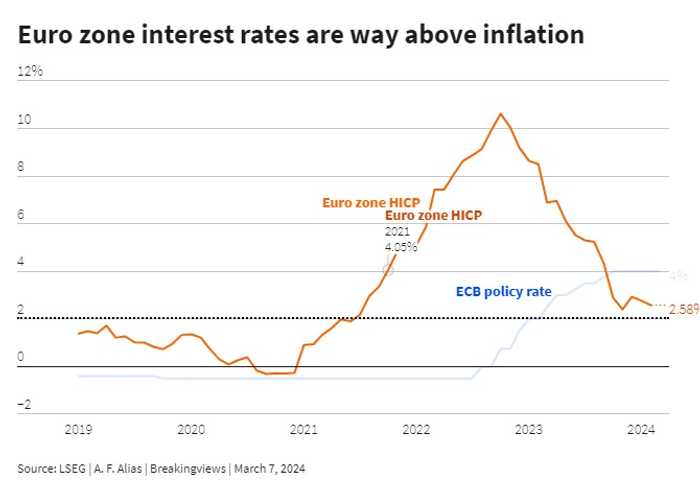Published 13:09 IST, March 8th 2024
Slow growth puts ECB before Fed in rate-cut line
ECB President has kept rates steady but hinted at lowering them from June.
- Republic Business
- 3 min read

Trading places. Christine Lagarde is cutting in line. The European Central Bank president on Thursday kept rates steady but hinted she will start lowering them from June. That could mean the ECB pips the U.S. Federal Reserve to become the first big central bank to ease policy. But that’s only because the euro zone is growing much slower than the United States.
"We will know a lot more in June.” With this seemingly anodyne phrase at her press conference on Thursday, Lagarde vaulted ahead of Fed boss Jerome “Jay” Powell as the major central banker most likely to cut rates first. What Lagarde wants to know is whether wage growth is slowing down sufficiently to reassure the Teutonic hard-liners among her colleagues that inflation will not rebound. Growth in euro zone negotiated wages fell to 4.46% in the fourth quarter of 2023, down from a record 4.69% in the previous quarter, but still well above a level consistent with the ECB’s 2% inflation target.
Data for this quarter will come out on May 23, in time for the June 6 meeting of the central bank. The comments led traders to overwhelmingly bet that the benchmark deposit rate will fall from a record high of 4% to 3.75% in June and 3% by December, according to derivatives prices collected by LSEG. In the United States, on the other hand, markets ascribe only a 14% chance to a rate cut in June.

Being first, in this case, is not the cause for celebration. The key reason why Lagarde ought to start easing policy soon is that euro zone GDP growth is flailing. The ECB’s own staff expects it to be just 0.6% this year, a downgrade from the 0.8% it expected in December. Compare that with the United States, where the Atlanta Fed estimates GDP is growing at a heady 2.5%, and it’s easy to see why Powell may need to wait before cutting rates. With growth so subdued, euro zone inflation is also abating. The ECB expects it to average 2.3% this year before hitting the 2% target in 2025 and falling below that in 2026. In the States, by contrast, the consumer price index rose 0.3% month-on-month in January for an annual reading of 3.1%.
With Powell worried about a resurgence of inflation driven by a hot economy and Lagarde trying to steer the euro zone clear of a recession, the ECB chief has the most compelling claim to cut first.
Updated 13:09 IST, March 8th 2024